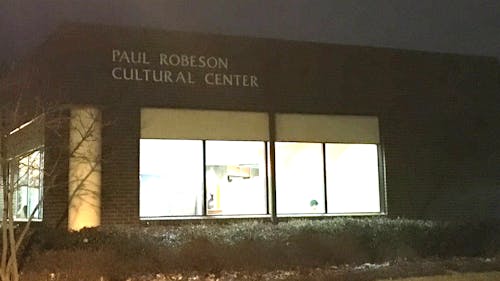Groups at Rutgers hold forum in solidarity after speaker's visit

“We are here to show support,” was repeated by nearly every person in the crowd as they introduced themselves at a forum to discuss Milo Yiannopoulos's visit to Rutgers last week.
Students and faculty gathered in the Paul Robeson Cultural Center on Busch campus to generate dialogue about Yiannopoulos’s visit and the protest that occurred during his lecture. A variety of different organizations and departments were present to listen, answer questions and show support.
Representatives from the Rutgers University Police Department, the Office of Violence Prevention and Victim Assistance, Counseling, Alcohol and other Drug Assistance Program and Psychiatric Services and the Bias Prevention and Education Committee were present. Members from the Black Student Union, the Asian American Cultural Center, Center for Latino Arts and Culture, College Student Affairs and many more were also in attendance.
Students and community members participated by sharing their personal experiences from the event and by looking for resolutions. Questions regarding the legal aspects of holding a protest and what actions the administration would take were asked.
Students described feeling scared, hurt and discriminated against following Yiannopoulos’s visit.
Melissa James, a School of Arts and Sciences junior, said she had trouble even getting into the building during the night of the event. They were only letting certain people in, she said. She said the security at the door would not let her in based off of her appearance.
”If you're promoting free speech, you should allow people (with) different opinions to come into the debate,” James said.
But James said this was not a debate, it was discrimination and it was not free speech, but hate speech.
“I am for debates and understanding other sides to different issues, but off the bat there was discrimination, not only from the organization but other students,” she said.
Yiannopoulos asked the crowd if they thought black lives mattered. When people raised their hands, James said Yiannopoulos told them get out and that rape culture did not exist.
“As a sexual assault survivor, that hurt me, I broke down crying after I left,” she said. “How can you say that is not violent? Maybe they did not hit me, but that took such a big toll on me emotionally.”
After hearing Yiannopoulos’s speech, Jasmine Dennis, a School of Arts and Sciences sophomore, said she also felt frustrated by what was said.
"I felt my identity was getting shot at by what he was saying and by what other people were saying,” she said.
What was frustrating for Dennis was not just Yiannopoulos and his responses, but the responses coming from her classmates.
James was scared to walk around campus the next day. Many others agreed and said they felt unsafe at the event and around campus afterward.
She believes the administration has not done enough, and that University Chancellor Richard L. Edwards’s email did not address the issue.
“It is upsetting that my mental health is not cared about by the University,” James said. “I do not know what else to do for us to be heard for us to be cared about. I deserve an apology, everyone in this room deserves an apology."
Dianne Techwei, a School of Environmental and Biological Sciences sophomore, said she was not angry, just frustrated.
She said people were clapping about things that are not true.
“He said it is in black people's nature to be angry. I am not an angry person,” she said. “It was revealing to see people who already had these thoughts. He was just there to confirm it.”
It was not so much about Yiannopoulos, but what he revealed about the Rutgers community, said Jannah Handy, director for Intercultural Initiatives in the Office of Student Affairs.
The event went on to answer questions and concerns of students by the faculty.
Representatives from the RUPD said that if a student feels threatened, the first step they should take is to call them.
“The whole point of the forum is for student to have recourses, namely the Bias reporting process, which can be found at bias.rutgers.edu. The students also have recourses at CAPS and points of contact and the cultural center and University wide,” Handy said.
Questions that remain unresolved were the line between hate speech and freedom of speech and social media regulations.
Attendees went around the room expressing how they felt in one word. “Impressed,” “hopeful,” “inspired” and “determined” were said.
____
Noa Halff is a School of Arts and Sciences sophomore. She is an associate news editor for The Daily Targum. Follow her on Twitter @NoaHalff for more.



